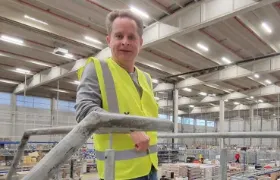The road to Net Zero isn’t always straight – and that’s okay
Catherine Bals is Sustainability Department Lead at Proximus. In this article, she shares some insights into the challenge of balancing commercial targets, customer demand, and sustainability goals as a major telecom operator with ambitious climate goals.
Catherine Bals
My LinkedIn profile
It would be nice to bring you only success stories. To tell you only how much progress we’re making with our environmental goals at Proximus, and how well we’re meeting all of our recycling targets. Nice, but not realistic. Because in a company, sometimes commercial and sustainability goals are at odds with each other. Not only that, but we also have to listen to our customers.
To say that this can be a delicate balancing act is an understatement. Today I want to discuss some of the realities that we face on our quest for Net Zero impact on climate, specifically when it comes to recycling old mobile devices and selling new or refurbished ones. The bottom line? We don't need a handful of people doing zero waste perfectly. We need millions of people doing it imperfectly.
The challenge: devices, old and new
Mobile devices have a serious climate impact. They contain numerous precious metals and their production requires a lot of energy. They need to be shipped around the world to end up in your purse or back pocket. And what’s even worse? Many of us end up using our phone for only a couple of years. Perhaps it falls and breaks in that time, perhaps the battery starts draining fast, or we simply hunger for a new device with a marginally better camera, a slightly faster operating system, or a longer battery life.
This desire for the latest and the greatest is understandable, but also problematic. In addition to the impact of the production of a new device, there’s also the question of what happens with the old device. In most cases, it ends up in a drawer, gathering dust for years on end. A real shame, because if we can recover old devices from customers, we are often able to refurbish them so that someone else can use them for a few more years. And even when that’s not an option, we can recycle the device and recover many of the precious materials in it, to produce new devices with a lower environmental impact.
Ramping up the rate of refurbishment and recycling is a major goal in Proximus’ plan to achieve Net Zero. But to do so, we need to collect old devices and find people who are willing to use them once they are refurbished. But convincing customers that a refurbished device will serve them just as well as a new one is proving just as difficult. So what can we do?
The solution: nudging, education, and patience
If I were an idealist, I would say: let’s simply stop selling new devices! Unfortunately, we don’t live in an ideal world. If we were to do this, consumers would simply go elsewhere to buy their new phones. And we can’t convince our customers to make better, greener choices if we don’t have any customers to begin with.
The more realistic answer is that we need to gradually embark customers and help them make greener choices. Last year, for example, we managed to collect 120.000 old devices by upping the financial incentive to turn them in. A lot of customers also simply don’t know that their old device is reusable or recyclable, while others are worried about data privacy. By focusing on recycling in promo campaigns to help educate and incentivize our customers, we can bring about gradual change that will pay off over time.
And it’s not just the customer who needs nudging: we also need a change of mindset among our own employees. By incentivizing our colleagues to propose refurbished phones or to help customers protect their device with Clear-Coat or accessories such as screen protectors, we enhance longevity. We also offer repair services and the possibility to have a temporary replacement phone in case of theft, loss or breakage. While it might be easier for our sales staff to sell the newest device, giving them also other objectives has proven effective in convincing more customers to make greener choices.
The bottom line: do the best you can
I think we all agree that our planet needs a change of course, and fast – another summer of extreme weather events around the world has once again hammered home that point. In that sense, it would be easy to argue that we’re not doing enough: we’re still selling and marketing new phones, which ultimately contribute to pollution and climate change. But sustainability is not a case of all-or-nothing. It’s a case of doing the best we can, all of us, to make better choices every day that add up to a big impact in the long run.
At Proximus, we realize that we have a huge responsibility when it comes to sustainable change, one we intend to take on fully. We may not be able to stop selling new phones overnight. But by showing our customers that there are viable alternatives and educating them about the value of their old devices, we can plant the seeds of more responsible smartphone usage. We look forward to the day we recover more old phones than sell new ones and have a balanced offering between new and refurbished devices. Until then, we intend to stay at the forefront of this (r)evolution towards a greener, more sustainable planet along with our customers, every step of the way.


